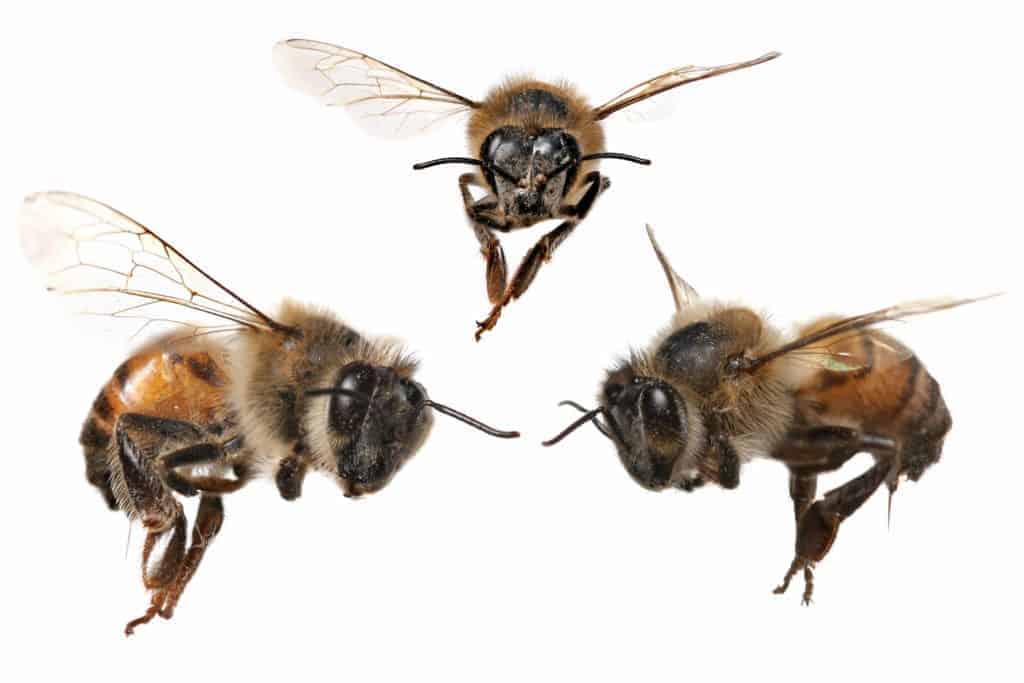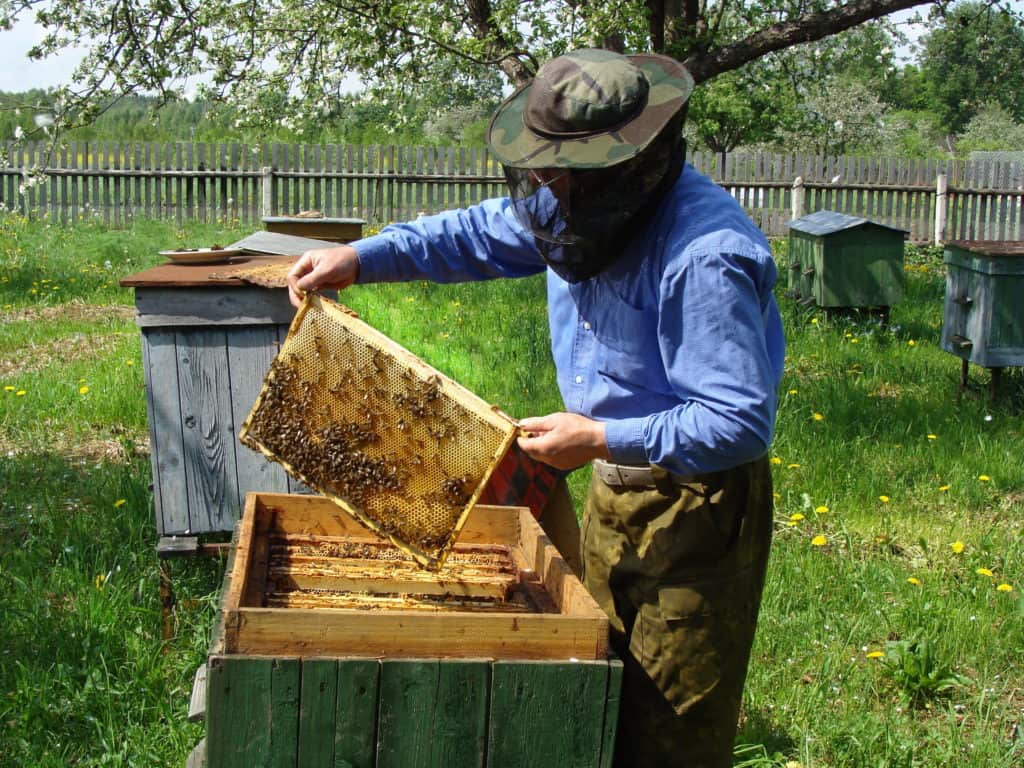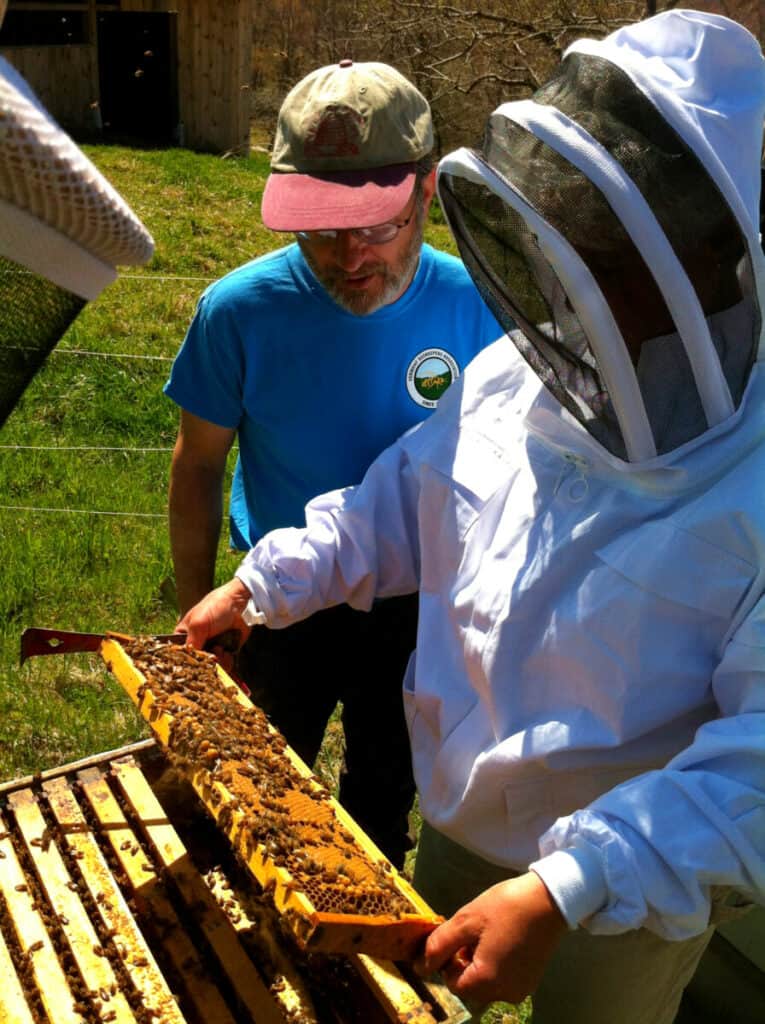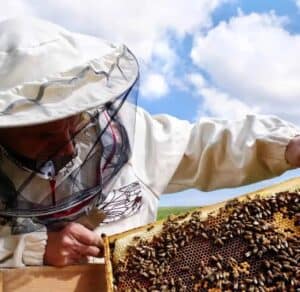Will You Get Stung While Wearing A Bee Suit? Not Sting Proof?
Honeybees for the most part are gentle creatures and will only sting when provoked. Which I can understand since your ripping open its home and stealing its food. So, this begs the question: how much protection does a bee suit really offer?
Will bees sting through a bee suit? No matter how careful you are, or what you wear, if your working bees you will get stung. A bee suit offers you good protection against stings, but it’s not sting proof only sting resistant. Although, it is better than getting a full unprotected sting.
I don’t know about you, but I can’t say I enjoy being stung. But as a new beekeeper there’s no avoiding it and some days will be worse than others. To wear a suit or not to wear a suit, let’s explore how much protection bee suits offer.
Can Bees Sting Through a Bee Suit

No matter how careful, gentle, and calm you are when handling bees you’re going to get stung. The difference as a beekeeper, which makes stings more tolerable, is that your psychologically prepared for it. In the back of your mind you realize that you will likely get stung working bees. Don’t get me wrong it still hurts but it’s not a shock.
There is a variety of bee suits available from full body suits to separate hats and veils, jackets, pants, and gloves. No matter the protection you choose your suit is not sting proof, more like sting resistant. It does offer some protection against the full effect of an unprotected sting, which I’m quite thankful for.
Your experience, and comfort level with handling bees will determine your bee suit preference. Some experienced beekeepers choose to only wear hat and veil while others will wear a full body suit. Now some choose to wear no protection, which is not recommended, you really don’t want to be stung near your eyes, nose or ears. Ouch, no thanks.
As you become more comfortable handling bees, you’ll decide what your more comfortable wearing for protection. Although, there is one thing all bee suits have in common, they’re white. Bees find light colors less threatening, so I suggest you don’t wear dark clothing when handling bees.
I would recommend washing your bee suit on a regular basis, after every handling of bees. Once the bees sting your suit, they leave pheromones that other bees can detect. These pheromones indicate to the rest of the colony that you are a danger to the hive. If the bees detect that pheromone every time your wear the suit your chances of getting stung will increase.
Be careful when removing your bee suit since bees love to crawl and are probably clinging to the fabric. I’d suggest removing your bee suit outside and carefully to prevent additional stinging. Bees are very good at finding small openings.
I also wrote an article all about how often you get stung as a beekeeper that I would encourage you to read!
What To Wear When Working With Bees

You should always wear some form of protective clothing when handling honeybees. There is a wide variety of bee suits and clothing available online and locally. Suits are commonly made of heavy white cotton canvas or several layers of bee-proof mesh netting. See the breakdown below of the most important protective gear:
Hat and Veil – always protect your head, you never want to get stung in or near your eyes. Hat and veils are available as standalone or included in a full body bee suit. The advantage of the full body suit ones is there is no gap between the jacket and hat.
Hat and veils often come in two forms: the veil forms a cylinder around the head, or has a vertical front called a fencing wall. Either style will work to ensure the veil is kept away from your face. You don’t want grumpy bees landing on the veil and stinging you in the face.
Jacket – a common choice among experienced beekeepers. Some prefer to wear a bee jacket instead up a full bee suit. Some jackets included a hat and veil which is nice since there is no gaps. Bee jackets are also available as ventilated or non-ventilated. During the summer months you want a ventilated bee jacket.
I would recommend a jacket with strong zippers and Velcro at the top of the zipper. Bees will often climb up the zipper to the top and you could receive a sting very close to your throat. A Velcro strap at the top prevents the bees from climbing that high.

Gloves – some beekeepers prefer to not use gloves and will endure the odd sting to their hand. It’s widely believed, by not wearing gloves, you can be gentler with the bees and less intrusive on the colony. Other experienced beekeepers prefer to always wear gloves without any noticeable issues.
As you gain experience, you’ll find your comfort zone regarding bee gloves. If you do wear them try to find a lightweight version.
Pants – again this will come down to personal preference. It’s not uncommon for beekeepers to not wear protective pants and just wear jeans, accepting that they will get stung from time to time. Don’t forget bees love to crawl and will crawl up the bottom of your pants. I would suggest you tuck the bottom of your pants into your socks, otherwise you may start dancing.
If you do use bee protective pants, they often have elastic around the ankle area to close tightly around your boots. This will prevent bees from exploring the inside of your pant legs.
Full Body Bee Suits – these offer the best protection and are highly recommended for anyone new to beekeeping. Since they offer the best protection, these suits are more commonly used by hobbyist and commercial operators alike.
These suits ensure there is no gaps and will have elastic in the wrist and ankle area to ensure a gap free seal. They are also available in regular or ventilated and again I’d go with ventilated in the hot summer months.
Take your time and get the right size because you don’t want a snug fitting bee suit. A nice loose-fitting bee suit is more comfortable and will decrease the chance of those stingers reaching you.
How To Handle Bees Without Getting Stung

As I’ve mentioned several times, if your working bees you will get stung. But its worth knowing how to reduce you’re your pain as much as possible. Follow the steps below and you’ll thank me later:
1. Use a smoker – this calms your bees and makes them less aggressive. Bees pickup on the smoke as an indication of a possible hive fire. They will eat extra honey as fast as possible in preparation to move the hive. Just don’t use to much smoke.
And for the type of fuel to use with your smoker I wrote an article about the 12 best fuels for your beehive smoker I encourage you to read!
2. Wear light colored protective clothing – as mentioned above.
3. Don’t block the hive entrance – bees need a clear flight path. If you block this while working on the hive your bees they will get irritated with you. If they begin buzzing around you and flying into you, best to move over before they start stinging.
4. Slow movements – don’t swat or wave your hands. Bees find fast movement threatening and this will make your bees grumpy. If you stay calm, relaxed, and move slowly and deliberately your bees will be less aggressive.
5. Fragrances – bees are attracted to a variety of fragrances. It’s best to not wear strong fragrances because this will attract bees and increase direct contact.
Always pay close attention to how the bees react to your actions and listen to their buzzing. If they begin to buzz louder and increase their circling and smacking into you, they probably believe you are threatening the hive.
If you can, it’s best to use smoke and quickly finish your inspection or move on to the next hive.
Related Questions
Do beekeepers build up resistance to bee stings? Most beekeepers are immune to honeybee stings, but not always. Some beekeepers will either build up resistance to the venom and a sting is nothing more than a minor annoyance. While others will build up a sensitivity to the venom. Just because you’re a beekeeper doesn’t necessarily mean you will be immune.
Do honeybees die after stinging? Sadly, a sting results in a death of a honeybee. The stinger on a honeybee is barbed, and the bees body is not strong enough to pull stinger out of your skin. Instead, part of the bees abdomen and digestive track is pulled away and kills the bee.
Why do bees pick up dead bees? Dead bees are removed from the hive to protect the colony against infection. The hive is so densely populated that diseases are easily spread through the colony. Undertaker bees can detect the smell of dead and dying bees and will immediately remove them from the hive.

Joseph Davis
My goal is to show that anyone can take up beekeeping and it can be a very rewarding hobby. I strive to share my experiences and answer any questions you may have.
